英语口语技巧 14种表达意见的方式
口语如何表达同意
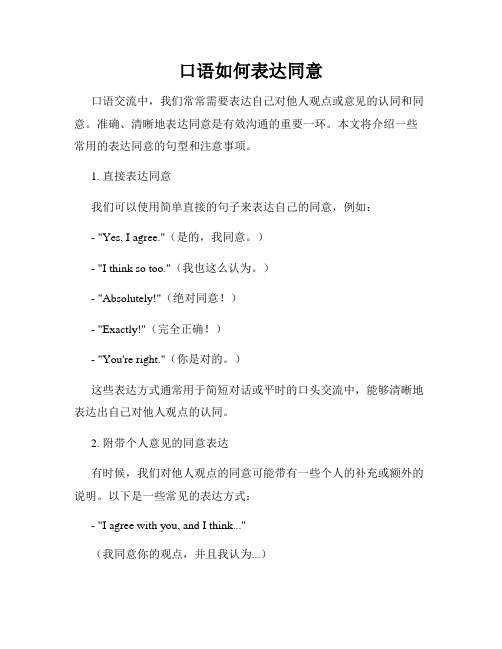
口语如何表达同意口语交流中,我们常常需要表达自己对他人观点或意见的认同和同意。
准确、清晰地表达同意是有效沟通的重要一环。
本文将介绍一些常用的表达同意的句型和注意事项。
1. 直接表达同意我们可以使用简单直接的句子来表达自己的同意,例如:- "Yes, I agree."(是的,我同意。
)- "I think so too."(我也这么认为。
)- "Absolutely!"(绝对同意!)- "Exactly!"(完全正确!)- "You're right."(你是对的。
)这些表达方式通常用于简短对话或平时的口头交流中,能够清晰地表达出自己对他人观点的认同。
2. 附带个人意见的同意表达有时候,我们对他人观点的同意可能带有一些个人的补充或额外的说明。
以下是一些常见的表达方式:- "I agree with you, and I think..."(我同意你的观点,并且我认为...)- "That's true, and in addition..."(没错,而且还有...)- "You're right, but I also believe..."(你说得对,但我还相信...)通过附加个人意见的方式,我们能够表达对他人观点的认可,同时提出自己的相关见解,丰富对话内容。
3. 引用他人观点来表达同意在口语交流中,我们也可以引用他人的观点来表达自己的同意,并加以赞同。
例如:- "As John said, I completely agree that..."(正如约翰所言,我完全同意...)- "Mary made a good point when she mentioned that..."(玛丽提到时说得很对,她说的...)通过引用他人的观点并展开表达,我们能够显示出对他人观点的重视和支持。
经典实用英语口语对话-给别人提意见和建议

★以下是英⽂写作翻译频道为⼤家整理的《经典实⽤英语⼝语对话-给别⼈提意见和建议》,供⼤家参考。
更多内容请看本站频道。
1. I think you should leave.我想你应该要离开⽐较好。
A: Should I stay?我该留下来吗?B: I think you should leave.我想你应该要离开⽐较好。
2. It's better to leave earlier to avoid the morning traffic.你早⼀点出门以避开早上的交通。
A: Should I leave earlier tomorrow morning?我应该明天早晨早⼀点出门吗?B: It's better to leave earlier to avoid the morning traffic.你早⼀点出门以避开早上的交通。
3. What should I do?我该怎么做?A: What should I do?我该怎么做?B: Buy a bunch of red roses and say that you're sorry.买⼀束红玫瑰花,然后说抱歉。
4. Why don't you wear your black suit and that yellow tie?穿那套⿊⾊的西装搭配那条黄⾊的领带。
A: Any suggestions for my meeting today?我今天要开会,有没有什么建议?B: Why don't you wear your black suit and that yellow tie?穿那套⿊⾊的西装搭配那条黄⾊的领带。
5. You need to wash it at least once a week.你⼀个礼拜⾄少要洗⼀次才⾏。
A: My car looks so dull.我车⼦的颜⾊看起来好雾喔。
用英文表达意见

用英文表达意见用英文表达意见一、表达意见1.In my opinion….我的意见是….2.I think/believe that我觉得/相信3.If you ask me….如果你问我….4.The point is that….我的观点是….5.As far as I’m concerned….就我而言…6.I’d like to say this….我会这样说二、表示同意他人意见1.So do I.我也这样认为2.I agree (with you) completely/entirely. 我完全认同(你说的)3.I can’t agree with you anymore.我非常同意你说的4.I feel the same way.我有同样的想法5.Exactly/ Of course表示绝对、当然三、表示反对他人观点1.I don’t think so.我不这样认为2.I’m afraid I disagree.我恐怕不是这么想反对完总是要说出自己的想法或是反对的原因,那你可以这样讲: 1. I don’t like to disagree with you, but….我不喜欢反对你,但….2. All right, but don’t you think….好吧,但你不觉得….3. ……However…..然而 (这可举出你部分同意的地方,再表述你觉得不好的地方)4. But what about…..?但关于…..方面呢?四、总结你的观点不管是刚说完自己的意见或是反对完他人的意见,都可以总结一下,表示得更清楚。
1.What I mean to say was….我的意思是说….2.Let me repeat what I said….让我整理重申我刚讲的是….五、询问他人意见1.What do you think about?你觉得怎样?2.How do you see it?你怎么看?3.What’s your view on the matter?这件事你的看法如何?4.Let’s have your opinion.让我们听听你的意见六、总结讨论1.Basically we’re in agreement.基本上我们有共识2.I think we have agree to disagree. 我想我们有相同点与不同点3.I think we have different opinions. 我知道我们有歧见。
表达意见的短语

表达意见的短语在日常生活和工作中,我们经常需要表达自己的意见和观点。
而恰当地使用一些常见的表达意见的短语,不仅能够提升我们的表达能力,还能让我们的意见更加准确和有影响力。
下面是一些常用的表达意见的短语及其用法,供大家参考。
1. 就我而言/I think that:这是一个常见的表达个人观点的短语。
在表达自己的意见时,可以使用这个短语来强调自己的立场。
例如:就我而言,我认为这个建议非常值得考虑。
2. 我坚信/I firmly believe that:用于表达强烈的信念和确信的观点。
例如:我坚信这个决定将会带来积极的结果。
3. 在我看来/From my perspective:用于表达个人观点,强调自己的视角。
例如:在我看来,这个问题的解决方案应该从根本上改变。
4. 毫无疑问/There is no doubt that:用于表达对某个事实或观点的确信。
例如:毫无疑问,这项政策将会对我们的经济产生积极的影响。
5. 有待商榷/It remains to be seen:用于表达一种观点,但同时也表示存在一定的不确定性。
例如:这个方案的可行性还有待商榷。
6. 在某种程度上/To some extent:用于表达一种观点,在一定程度上说明问题。
例如:在某种程度上,这个计划能够解决一部分问题。
7. 根据我的观察/Based on my observation:用于表达观察所得的结论。
例如:根据我的观察,市场需求正在逐渐增长。
8. 据我所知/To the best of my knowledge:用于表达根据自己所知的信息进行判断。
例如:据我所知,这个项目已经完成了前期的准备工作。
9. 不容忽视/Cannot be ignored:用于强调某个事实或观点的重要性。
例如:这个问题的影响不容忽视,我们必须采取行动。
10.鉴于此/In view of this:用于引出一个相关的事实或观点。
例如:鉴于此,我们需要制定更加全面的措施来应对这个问题。
用英语提建议的表达方式

提建议的表达方式(一)提建议的表达方式:1. Why don't you...? / Why not ...?后接动词原形。
如:Why don't you / Why not get him a book?你为什么不给他买本书呢?2. How about ...? / What about ...? 后接动名词(Ving)、名词或者代词宾格。
如:How about / What about this blue scarf?这条蓝色围巾怎么样?3. You'd better (not) do sth. 意为“你最好(不)做某事。
”如:You'd better take off your coat. It's too hot here.你最好脱掉你的外套。
这里太热了。
4. Let's ..., shall we? Let's后接动词原形,意为“咱们……,好吗?”,如:Let's go shopping, shall we?我们去购物吧,好吗?5. Shall we / I ...?,如:Shall we go boating?我们去划船好吗?6. Would you like ...? 后接名词(Ving)或动词不定式(to do),意为“你们/你想要……吗?”,如:Would you like to go shopping with me?你愿意跟我一块儿去购物吗?7. Would you please ...? 后接动词原形,意为“请你……好吗?”,如:Would you please turn down the radio?请把收音机音量关小一点好吗?(二) 回答建议的表达方式:1. 同意对方建议时,一般用:Good idea. / Sounds good. 意为“好主意。
/听起来不错。
”Yes, please. / I'd like / love to. 意为“是的,请。
英语学习资料:如何用英文委婉的提建议

英语学习资料:如何用英文委婉的提建议1. 用Shall we...?在表示建议或征求对方意见时,可用以Shall开头的一般疑问句。
其肯定回答一般可用:All right, OK, Good idea等。
2. 用Let's...?表示“让我们”(包括双方在内)做某事“这一建议时要用以Let's 开头的祈使句。
而Let us在表示让我们做某事时,不包括对方在内。
如:Let's go and see the pandas. Let us go, will you?让我们去吧,好吗?3. 用Why not...?Why not...?意思是:为什么不……?后接不带to 的不定式(即动词原形)。
Why not...?是省略了主语的省略形式,完整句Why don't you/they/we...?如:Why don't you go with me? Why don't you try again?=Why not try again?4. 用What about...?意为“……怎么”后可接名词、的代词和动名词。
如:What about going out for a walk? I'm going to the park.What about you?5. 用had better 意为“最好”,“还是……好”,常用于口语,后接动词原形。
如:You had better stay at home. You'd better go now.6. 用Don't...来表示建议,通常用于祈使句的否定形式中。
如:Don't play in the street. Don't throw it like that.7. Would you like+短语?这个句型意思是“……怎么样?”后接sth. 或to do sth.如:Would you like another cup of tea? Would you like some colour pencils?8. Will you please+动词原形……?它的意思是“请你……好吗?”如:Will you please e tomorrow? Will you please pick it up?。
用英语提建议的表达方式

提建议的表达方式(一)提建议的表达方式:1. Why don't you...? / Why not ...?后接动词原形。
如:Why don't you / Why not get him a book?你为什么不给他买本书呢?2. How about ...? / What about ...? 后接动名词(Ving)、名词或者代词宾格。
如:How about / What about this blue scarf?这条蓝色围巾怎么样?3. You'd better (not) do sth. 意为“你最好(不)做某事。
”如:You'd better take off your coat. It's too hot here.你最好脱掉你的外套。
这里太热了。
4. Let's ..., shall we? Let's后接动词原形,意为“咱们……,好吗?”,如:Let's go shopping, shall we?我们去购物吧,好吗?5. Shall we / I ...?,如:Shall we go boating?我们去划船好吗?6. Would you like ...? 后接名词(Ving)或动词不定式(to do),意为“你们/你想要……吗?”,如:Would you like to go shopping with me?你愿意跟我一块儿去购物吗?7. Would you please ...? 后接动词原形,意为“请你……好吗?”,如:Would you please turn down the radio?请把收音机音量关小一点好吗?(二) 回答建议的表达方式:1. 同意对方建议时,一般用:Good idea. / Sounds good. 意为“好主意。
/听起来不错。
”Yes, please. / I'd like / love to. 意为“是的,请。
英语口语:14种方式诠释“我认为”

英语口语:14种方式诠释“我认为”1. I thinkThis is the most common and general way of giving an opinion. You can use it both informally and formallyI think是表达意见最常用、最普遍的方式,正式与非正式场合皆可用。
例句:I think if you offer a consistently good service to your clients, they will keep coming back to you。
我认为如果你给客户提供始终如一的优质服务,他们会一直选择你们的服务。
2.I reckonThis is a more informal way of giving your opinion:这个表达更多地用在非正式场合。
例句:I reckon it will be much faster to get to London by train。
我认为坐火车去伦敦会更快。
3. In my opinionThese expressions are more formal and are often used when talking about important issues这两个词组比较正式,并且通常在讨论重要问题时使用。
例句:In my opinion, the Bank of England should not raise interest rates this year。
我认为英国银行今年不应该增加利息。
4. In my viewIn my view, they made a huge mistake in not selling thecompany when they had the chance。
在我看来,当他们有机会卖掉公司时却不卖是个重大的错误。
5. It seems to meWhen you’ve thought about a situation carefully you could use either of these two expressions。
口语中的表达意见和反驳观点
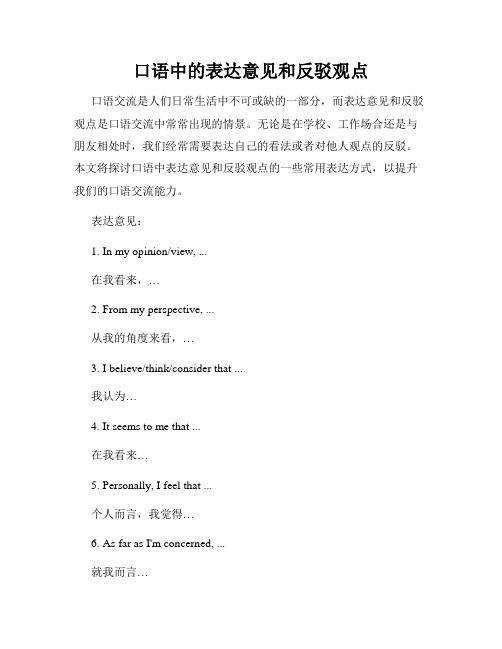
口语中的表达意见和反驳观点口语交流是人们日常生活中不可或缺的一部分,而表达意见和反驳观点是口语交流中常常出现的情景。
无论是在学校、工作场合还是与朋友相处时,我们经常需要表达自己的看法或者对他人观点的反驳。
本文将探讨口语中表达意见和反驳观点的一些常用表达方式,以提升我们的口语交流能力。
表达意见:1. In my opinion/view, ...在我看来,…2. From my perspective, ...从我的角度来看,…3. I believe/think/consider that ...我认为…4. It seems to me that ...在我看来…5. Personally, I feel that ...个人而言,我觉得…6. As far as I'm concerned, ...就我而言…7. What I'm trying to say is ...我的意思是…8. I'm of the opinion that ...我持有的意见是…9. It's clear to me that ...对我来说很明显…10. From where I stand, ...从我的立场来看…反驳观点:1. I see what you're saying, but ...我了解你的观点,但是…2. I understand where you're coming from, but ...我理解你的观点,但是…3. That's one way to look at it, but ...那也是一种看法,但是…4. I get your point, but ...我理解你的观点,但是…5. I take your point, but ...我理解你的观点,但是…6. I hear what you're saying, but ...我听明白你的观点,但是…7. I can see why you think that, but ...我能理解你为什么这样认为,但是…8. I respect your opinion, but ...我尊重你的观点,但是…9. I don't entirely agree because ...我并不完全同意,因为…10. That may be true, but ...那可能是对的,但是…以上是口语中表达意见和反驳观点常用的表达方式,当然在实际交流中,我们还需根据具体情景和对话对象选择合适的表达方式。
(完整版)如何用英语委婉提建议?

如何用英语委婉提建议?1. I think you should…“我认为你应该做某事”,这就是很直接的提建议的方式。
I think you should exercise more.我认为你应该多运动运动。
I think you should raise your sights. You're underestimating yourself.我认为你应该有远大志向,你过于低估自己了。
2. I don't know if…is a good idea.当你使用这个表达时,你的语气是比较消极的。
也就是说,其实你并不觉得这是个好主意。
Josh, I don't know if that's a good idea.乔希,我可不知道这是不是个好主意。
I don't know if taking a year off work is a good idea.我不知道休假一年是不是个好主意。
3. Maybe you should try…和上一个表达不同,当你说“也许你该试着做某事”的时候,语气是很积极的,你在鼓励别人去尝试。
Maybe you should try studying a new skill.也许你应该试着学习一项新技能。
Maybe you should try harder, but not live on your name.也许你应该更努力,而不能靠名声过日子。
4. I wouldn't…would能够用作劝告,一般用在I后面。
当你说这句话的时候,你的态度还是比较坚决的。
I wouldn't (= I advise you not to) worry about it, if I were you.如果我是你,我就不会为它担心。
I wouldn't be saying this unless I were sure of the facts.要是我对这些事情没有把握,我就不说这话了。
口语教案:如何用地道的口语表达意见与建议

口语教案:如何用地道的口语表达意见与建议一、引言在日常生活中,我们经常需要表达自己的意见和建议。
地道的口语表达能够让我们更准确地传达自己的想法,与他人进行有效的沟通。
本教案将介绍如何用地道的口语表达意见与建议,旨在帮助提升口语交流能力。
二、表示个人意见1. "In my opinion..."当我们想要表达个人意见时,可以使用"In my opinion..."作为引导语。
这是一种常见且直接的表达方式。
例如,"In my opinion, we should invest more in renewable energy sources."2. "I believe that..."另一种表示个人观点的方式是使用"I believe that..."。
这种表达方式能够突出个人的信念和观点。
例如,"I believe that everyone should have access to affordable healthcare."3. "From my perspective..."使用"From my perspective..."能够表达自己的角度和观点。
这是一种较为客观的表达方式,不过仍然强调了个人的意见。
例如,"From my perspective, the government should prioritize environmental protection."三、提出建议1. "I suggest (that)..."当我们想要提出建议时,可以使用"I suggest (that)..."开头。
这种表达方式表明自己的建议,并在后文中对其进行具体阐述。
例如,"I suggest that we organize regular team-building activities to improve collaboration."2. "We should consider...""We should consider..."表示我们应该考虑某个方案或建议。
怎样有礼貌地用英语向别人提建议
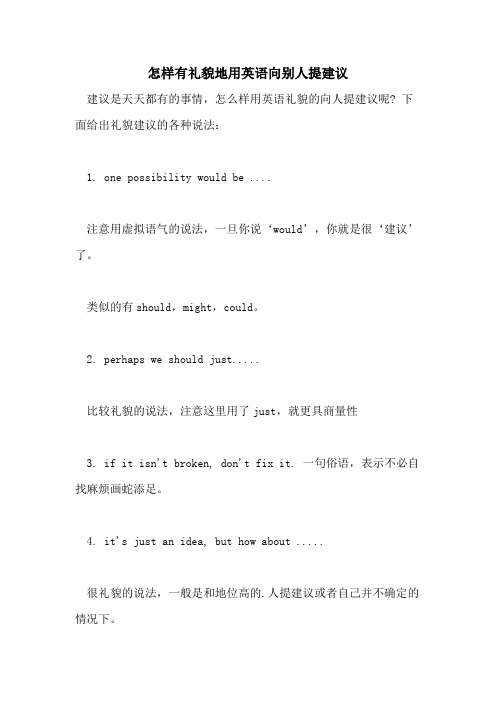
怎样有礼貌地用英语向别人提建议
建议是天天都有的事情,怎么样用英语礼貌的向人提建议呢? 下面给出礼貌建议的各种说法:
1. one possibility would be ....
注意用虚拟语气的说法,一旦你说‘would’,你就是很‘建议’了。
类似的有should,might,could。
2. perhaps we should just.....
比较礼貌的说法,注意这里用了just,就更具商量性
3. if it isn't broken, don't fix it. 一句俗语,表示不必自找麻烦画蛇添足。
4. it's just an idea, but how about .....
很礼貌的说法,一般是和地位高的.人提建议或者自己并不确定的情况下。
类似的也有:what about .....
how about 后面也可以加更多内容,如:how about u do the dishes and i watch TV?
5. shall we .... what if .....
也是礼貌的提建议。
模板,内容仅供参考。
在英语中提建议的表达方式
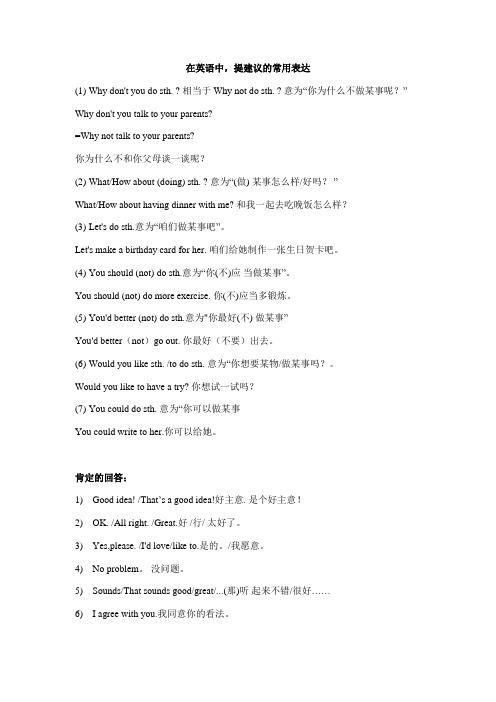
在英语中,提建议的常用表达(1)Why don't you do sth. ? 相当于 Why not do sth. ? 意为“你为什么不做某事呢?”Why don't you talk to your parents?=Why not talk to your parents?你为什么不和你父母谈一谈呢?(2)What/How about (doing) sth. ? 意为“(做) 某事怎么样/好吗? ”What/How about having dinner with me? 和我一起去吃晩饭怎么样?(3)Let's do sth.意为“咱们做某事吧”。
Let's make a birthday card for her. 咱们给她制作一张生日贺卡吧。
(4)You should (not) do sth.意为“你(不)应当做某事”。
You should (not) do more exercise. 你(不)应当多锻炼。
(5)You'd better (not) do sth.意为"你最好(不) 做某事”You'd better(not)go out. 你最好(不要)出去。
(6)Would you like sth. /to do sth. 意为“你想要某物/做某事吗?。
Would you like to have a try? 你想试一试吗?(7)You could do sth. 意为“你可以做某事You could write to her.你可以给她。
肯定的回答:1)Good idea! /That’s a good idea!好主意. 是个好主意!2)OK. /All right. /Great.好 /行/ 太好了。
3)Yes,please. /I'd love/like to.是的。
/我愿意。
4)No problem。
口语表达表达建议和请求的常用句型

口语表达表达建议和请求的常用句型口语表达建议和请求的常用句型在日常生活和工作中,我们经常需要向别人提出建议或请求帮助。
通过口语表达建议和请求,我们可以更好地与他人沟通和合作。
在下面的文章中,我将介绍一些常用的口语句型,帮助您表达建议和请求。
1. 对建议的表达:- I suggest (that) you...(我建议你...)- How about (doing) ...?(...怎么样?)- You might want to consider...(你可以考虑一下...)- If I were you, I would...(如果我是你,我会...)- It would be a good idea to...(...是个好主意)例如:I suggest (that) you take a break and relax.你应该休息放松一下。
How about going to the cinema tonight?今晚去看电影怎么样?You might want to consider buying a new laptop.你可以考虑买一台新的笔记本电脑。
2. 对请求的表达:- Can/Could you...?(你可以...吗?)- Would you mind (doing)...?(你介意...吗?)- I was wondering if you could...(我想知道你能否...)- Do you think you could...?(你觉得你能...吗?)- Could you please...?(你能请...吗?)例如:Can you help me carry these bags?你能帮我拿这些袋子吗?Would you mind closing the window?你介意关上窗户吗?I was wondering if you could lend me your notes.我想知道你能不能借给我你的笔记。
实用英语口语学习:给别人提意见和建议常用句型及对话
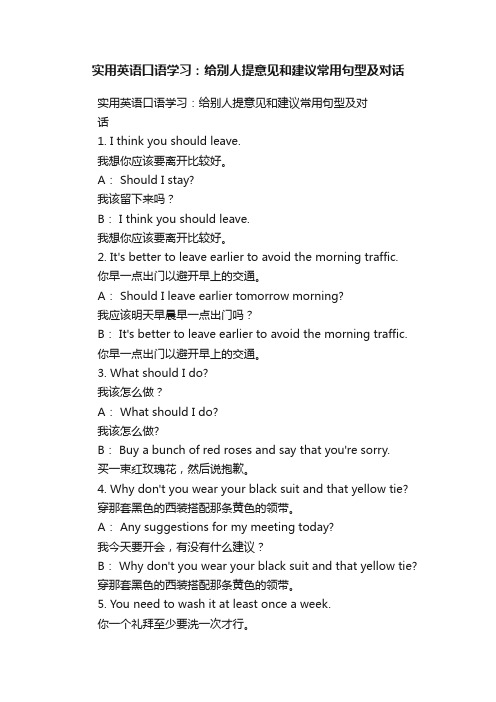
实用英语口语学习:给别人提意见和建议常用句型及对话实用英语口语学习:给别人提意见和建议常用句型及对话1. I think you should leave.我想你应该要离开比较好。
A: Should I stay?我该留下来吗?B: I think you should leave.我想你应该要离开比较好。
2. It's better to leave earlier to avoid the morning traffic.你早一点出门以避开早上的交通。
A: Should I leave earlier tomorrow morning?我应该明天早晨早一点出门吗?B: It's better to leave earlier to avoid the morning traffic. 你早一点出门以避开早上的交通。
3. What should I do?我该怎么做?A: What should I do?我该怎么做?B: Buy a bunch of red roses and say that you're sorry.买一束红玫瑰花,然后说抱歉。
4. Why don't you wear your black suit and that yellow tie? 穿那套黑色的西装搭配那条黄色的领带。
A: Any suggestions for my meeting today?我今天要开会,有没有什么建议?B: Why don't you wear your black suit and that yellow tie? 穿那套黑色的西装搭配那条黄色的领带。
5. You need to wash it at least once a week.你一个礼拜至少要洗一次才行。
A: My car looks so dull.我车子的颜色看起来好雾喔。
B: You need to wash it at least once a week.你一个礼拜至少要洗一次才行。
口语如何表达不同意见

口语如何表达不同意见在日常交流和讨论中,人们经常会表达不同的意见。
无论是在工作环境中还是在社交场合中,表达不同意见是一种常见的现象。
然而,如何用口语清晰地表达自己的立场并与他人进行有效的辩论却是一项具有挑战性的任务。
本文将探讨口语中如何表达不同意见的几种常见方式。
1.使用转折词表达不同意见在口语中,使用转折词可以帮助我们清晰地表达不同意见。
以下是一些常用的转折词:1.1.但是 (however)例如:我理解你的观点,但是我认为我们应该采取不同的方案。
1.2.然而 (yet)例如:他们认为这个决策是正确的,然而我不同意。
1.3.尽管 (although)例如:尽管他们认为这是正确的做法,我仍然坚持我的观点。
2.使用强调词强调自己的立场除了使用转折词外,使用强调词可以帮助我们更加明确地表达不同的意见。
以下是一些常见的强调词:2.1.无论如何 (no matter what)例如:无论如何,我都不同意这个观点。
2.2.毫无疑问 (without a doubt)例如:毫无疑问,我对这个计划表示担忧。
2.3.确信 (convince)例如:我确信这个决定是错误的。
3.使用礼貌措辞表达不同意见在表达不同意见时,我们应该尽量使用礼貌的措辞,以避免冲突和不必要的争吵。
以下是几种礼貌表达不同意见的方式:3.1.我理解你的观点,但是我有一些不同的想法。
3.2.我明白你的意思,但是我认为我们应该考虑其他选项。
3.3.我能理解你的立场,但是我依然坚持我的观点。
4.回应他人的不同意见在口语交流中,我们经常会遇到他人对我们的观点表示不同意见的情况。
以下是一些回应他人不同意见的方式:4.1.谢谢你的观点,我会考虑一下。
4.2.我理解你的立场,但是我认为我的观点更合理。
4.3.很高兴听到你的不同意见,但是我还是坚持我的看法。
总结:在口语中表达不同意见并不是一件容易的事情。
使用转折词、强调词和礼貌的措辞可以帮助我们清晰地表达自己的观点,并与他人进行有效的辩论。
口语中的赞同和反对用语
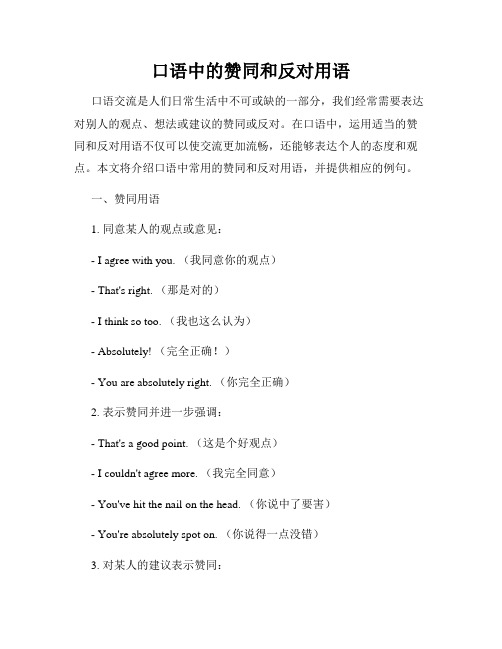
口语中的赞同和反对用语口语交流是人们日常生活中不可或缺的一部分,我们经常需要表达对别人的观点、想法或建议的赞同或反对。
在口语中,运用适当的赞同和反对用语不仅可以使交流更加流畅,还能够表达个人的态度和观点。
本文将介绍口语中常用的赞同和反对用语,并提供相应的例句。
一、赞同用语1. 同意某人的观点或意见:- I agree with you. (我同意你的观点)- That's right. (那是对的)- I think so too. (我也这么认为)- Absolutely! (完全正确!)- You are absolutely right. (你完全正确)2. 表示赞同并进一步强调:- That's a good point. (这是个好观点)- I couldn't agree more. (我完全同意)- You've hit the nail on the head. (你说中了要害)- You're absolutely spot on. (你说得一点没错)3. 对某人的建议表示赞同:- That's a great idea. (这是个好主意)- I think we should definitely do that. (我觉得我们一定应该这样做)- We should give it a try. (我们应该试一试)- I second that. (我赞同)二、反对用语1. 不同意某人的观点或意见:- I disagree. (我不同意)- That's not right. (那不对)- I'm afraid I can't go along with you on that. (恐怕我不能同意你的观点)- I'm not so sure about that. (我对此持怀疑态度)- I don't think so. (我不这么认为)2. 表示反对并给出理由:- I see your point, but... (我理解你的观点,但是……)- I'm afraid I have to disagree with you on that. (恐怕我不能同意你的观点)- I'm sorry, but I think you're mistaken. (抱歉,但我认为你弄错了)- I have a different opinion. (我有不同的观点)- I'm not convinced. (我不被说服)3. 提出异议或反对的原因:- The reason why I disagree is... (我不同意的原因是……)- I think there are some flaws in your argument. (我觉得你的论点有些漏洞)- I don't think it's a good idea because... (我认为这不是一个好主意,因为……)- I have some concerns about... (我对……有些担心)- It doesn't make sense to me. (我不明白)总结:在口语交流中,正确地使用赞同和反对用语能够体现出个人的观点和态度。
- 1、下载文档前请自行甄别文档内容的完整性,平台不提供额外的编辑、内容补充、找答案等附加服务。
- 2、"仅部分预览"的文档,不可在线预览部分如存在完整性等问题,可反馈申请退款(可完整预览的文档不适用该条件!)。
- 3、如文档侵犯您的权益,请联系客服反馈,我们会尽快为您处理(人工客服工作时间:9:00-18:30)。
英语口语技巧 14种表达意见的方式In life we're often asked to give our opinion, or in some cases, we give our opinion even if it hasn't been asked for!生活中,经常有人会询问我们的意见,或者在某些情况下,即使没有被询问,我们也会给出自己的意见。
Sometimes we can be very direct with our opinion and it won't upset the other person. However, more often than not we need to be careful how we share our thoughts so as not to offend or hurt the other person's feelings. This can be especially true in business where cultural differences can have a detrimental effect on business dealings.有时我们可以非常直接地表达我们的意见,且不会让别人不开心。
但是,为了不伤害或冒犯到他人,我们通常需要小心翼翼的分享我们的想法。
这在商界尤其重要,因为文化差异可能会对交易产生不利影响。
The British are especially careful when giving their opinion (in business, that is). They often don't want to cause offence and consequently, will start their sentences using certain expressions to soften the blow. A number of my clients have said that the British are very polite and considerate in their dealings with colleagues and clients. So much so, that the British way of doing business is often admired.英国人在表达自己的意见时特别小心(在商界)。
他们通常不想冒犯别人,所以开始会使用一些特定的表达来缓和接下来的内容。
我的顾客中有很多人都说过英国人在和同事及顾客处理问题时都非常地礼貌和体贴。
所以,英国人做生意的方式通常都是令人钦佩的。
In this post, I'd like to share with your some common expressions we have of giving one's opinion. I have used Liz Potter's excellent article for Macmillan Dictionary's blog as the main structure and made some changes to it.在这篇文章中,我想分享一些在表达意见时会用到的常用词组。
我用Liz Potter 为麦克米伦字典的博客写的一篇优秀文章作为主要结构,并做了一些改动。
1. I thinkThis is the most common and general way of giving an opinion. You can use it both informally and formallyI think if you offer a consistently good service to your clients, they will keep coming back to you.1.I think这是最常用、最普遍的表达意见的方式。
正式和非正式情况下都可以使用。
我认为如果你给客户提供始终如一的优质服务,他们会一直选择你们的服务。
2.I reckonThis is a more informal way of giving your opinion:I reckon it will be much faster to get to London by train.2.I reckon一种更加非正式的表达意见的方式我认为坐火车去伦敦会更快。
3. In my opinion (4) In my view:These expressions are more formal and are often used when talking about important issuesIn my view, they made a huge mistake in not selling the company when they had the chance.In my opinion, the Bank of England should not raise interest rates this year.3.In my opinion (4) In my view:这两个表达更加正式,并且通常在谈论重要问题时使用。
在我看来,当他们有机会卖掉公司时却不卖是个重大的错误。
在我看来,英国银行今年不应该增加利息。
5. It seems to me (6) All things considered:When you've thought about a situation carefully you could use either of these two expressions.It seems to me that they are spending more money than they need to to attract new talent into the company.All things considered, I think we made a wise choice in recruiting James.5. It seems to me (6) All things considered:当你已经仔细考虑过一种情形时,你可以使用两种表达中任意一种:在我看来,在为公司引进新人才时,他们的花费比实际需求多很多。
总的来看,我认为招聘詹姆斯是一个明智的选择。
7. If you ask meThis is used when your opinion is critical. Sometimes, people say this even when their opinion hasn't been asked for! –"If you ask me,….." "But I didn't ask you….!"If you ask me, she has spoilt her children far too much.7. If you ask me 当你的意见带有批评性质的时候使用这种表达。
有时,人们甚至会在没有被询问意见的时候使用这个短语!-"依我看…""但是我没有问你…"!依我看,她太过溺爱她的孩子了。
8. To be honest (9) To tell you the truth (10) To be frankAll three expressions are a way of giving your opinion when you know that people may not like what you have to sayTo tell you the truth, your father was right when he said that you undersold the company.To be honest, I preferred it when you were blonde.To be frank, I thought her acting was simply terrible.8. To be honest (9) To tell you the truth (10) To be frank知道别人可能不喜欢你要说的话时,可以用这三种表达来给出你的意见。
老实告诉你,你父亲对你低价抛售公司的判断是对的。
老实说,我更喜欢你金发的样子。
坦白地说,我觉得他的表演很糟糕。
11. Frankly speakingYou would use this expression to give your opinion in a more familiar and forthright way.Frankly speaking, I don't know what she sees in him.11. Frankly speaking这是一种更亲近和直率的表达意见的方式。
坦白地说,我不知道她看上他哪一点。
12. PersonallyThis is used to emphasize that you are giving your own opinionPersonally, I think the CEO should apologize for his appalling behaviour at the shareholders' meeting.12. Personally这个短语通常用来强调你标的的只是个人意见。
就我而言,我认为总裁应该为他在董事会的恶劣行为道歉。
13. To my mind (14) As far as I'm concernedWhen you realise that other people may not agree with you you would use either of these expressions:To my mind, private education is better than state education.As far as I'm concerned, tennis is a much more interesting sport than football.13. To my mind (14) As far as I'm concerned当你意识到其他人可能不同意你的观点时,可以使用这两种表达中的任意一种:依我看,私立教育比公立教育好。
